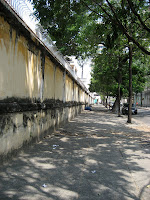After our trip to Hue, I spoke to my Vietnamese teacher about what I had experienced there, and as always Thay had some things to say about these matters. We talked for a while about the Mandarins, as Hue was the place where they had taken their examinations. To become a Mandarin, which was a kind of high level government officer adopted from Chinese culture, a person had to pass a series of examinations which took days to complete and was so tricky that many had to repeat the test several times before they were successful. Thay said that in the old days potential candidates would walk from southern Vietnam to Hue in order to sit the tests. This was a journey that took months and could be dangerous, because of deserted roads that were prowled by wild animals.
Obviously it was worth it for the chance to hold this prestigious title, and Vietnam still honours their most esteemed Mandarins by naming streets after them, though not the most famous streets, which are reserved for military heroes who defeated the Chinese, the great Kings and Emperors and some revered Communist reformers.
Was Chu Manh Trinh a Mandarin? I wondered as I visited the street named after him this morning. It’s not a main street, and is only a few hundered metres long, though still very centrally located in District One. Chu Manh Trinh’s position is part of its appeal, in that you step off the main drag of fashion boutiques, hotels and foreign restaurants into this little pocket of old Saigon charm. Skyscrapers may loom in all directions but this street still retains a feeling of authenticity.
When we lived in another part of the city, we got to know Chu Manh Trinh because we would often walk home along it in the evenings for a chance to see “the ice men”, as we called them. With darkness surrounding, one man would stand in the back of a steaming cold truck pushing out metre long slabs of ice to another, who would hoist this hefty weight on his shoulder with just a small piece of newspaper to protect his skin. Then this wiry man would run with it, about 20 metres or so to a mysterious building in the depths of an alley. Backwards and forwards he would go, and this event occurred around the same time every night.
Today when we turn into Chu Manh Trinh we see an outdoor barber, his business just a chair and a mirror against a wall. The barber snips away on the shiny bowl hair of a small boy, who is watching his reflection and the barber’s work with some suspicion. Next we come to a street market that operates every day on this street. The stalls are protected from the sun by a hotch potch of plastic awnings. They are well stocked in the morning, and the dozen or so vendors cover all food needs. Perhaps a market strip like this was more common in the old days, but now you don’t see them like this very often. I think how much more leisurely it would be to do a daily shop here, and avoid the agitation of the big markets.
We stop for some breakfast at a Banh Cuon stall. These are freshly steamed sheets of rice noodle served with pork sausage. I am coming back for another taste of this smiley woman’s banh cuon, because they have a particular delicacy, so light and silky that they slip down very quickly, though not so fast that you can’t enjoy the crunch and sweetness of the accompanying fried shallots, and the tang of the nuoc cham. We eat at knee high metal tables and watch the passing traffic, though it’s not too busy, just enough old men on bicycles, families on motorbikes and occasional meandering toddler or animal to keep us entertained. Looking across the street there are a couple of old colonial buildings behind high stone walls, one is bulging with fig tree roots and sprouts. On our side, to the left of us is a similar wall, though the footpath is surprisingly clear, all you can see on the ground is the dappled shadows of the foliage above.
I did try to find some information on the internet about Chu Manh Trinh later in the day. It was limited in English, but from what I could gather, he was not a Mandarin, instead a poet who died in 1905. His vocation is fitting, I trust he would be happy and inspired strolling his street, even in this age.




No comments:
Post a Comment